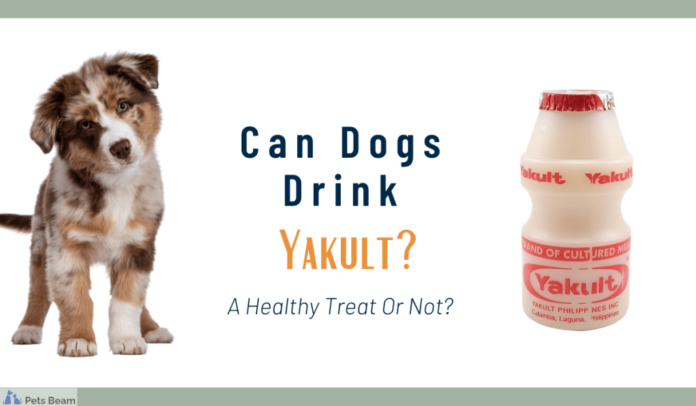Hey there, fellow pet parents! Ever caught your pup giving those puppy eyes while you’re sipping on your favorite Yakult? I’ve been there, and I know exactly what you’re thinking – “Is Yakult good for dogs?” Let’s dive deep into this topic and find out everything you need to know about giving Yakult to your four-legged bestie!
The Quick Answer
TL;DR While Yakult isn’t toxic for dogs, it’s not really the best probiotic choice for them. There are better, dog-specific alternatives available.
What’s Actually in Yakult?
Before we go any further, let’s break down what’s inside that tiny bottle:- Skimmed milk- Sugar- Glucose-fructose syrup- Live bacterial cultures (Lactobacillus casei Shirota strain)- Flavoring- Water
Why People Think About Giving Yakult to Dogs
Look, I get it! We all want the best for our fur babies, and since Yakult’s got those good bacteria that help our tummies, it seems logical to share it with our dogs. Plus, these are some common reasons why pet parents consider it:
- Digestive issues
- After antibiotic treatment
- Immune system support
- Diarrhea problems
The Good Stuff (Potential Benefits)
While Yakult isn’t specifically made for dogs, it does contain some potentially beneficial ingredients:
- Probiotics: Can help with digestive health
- Calcium: Good for bones and teeth
- Protein: From the skimmed milk base
The Not-So-Good Stuff (Risks and Concerns)
Here’s where things get a bit tricky There are several reasons why Yakult might not be the best choice for your doggo
1. Sugar Content
Yakult contains quite a bit of sugar, which isn’t great for dogs Too much sugar can lead to – Weight gain- Dental problems- Diabetes risk- Upset tummy
2. Lactose Issues
Many dogs are lactose intolerant, and even though Yakult contains less lactose than regular milk, it might still cause:- Diarrhea- Gas- Stomach discomfort- Vomiting
3. Wrong Bacterial Strain
The probiotic strain in Yakult (L. casei Shirota) is specifically designed for humans, not dogs. Our furry friends need different bacterial strains that are more suited to their digestive systems.
Better Alternatives for Your Pup
Instead of Yakult, consider these dog-friendly probiotic options:
-
Veterinary-Approved Probiotics
- Specifically formulated for dogs
- Correct bacterial strains
- Proper dosage
-
Natural Alternatives
- Plain, unsweetened yogurt (in small amounts)
- Kefir (plain, no sugar)
- Fermented vegetables
-
Probiotic Supplements
- Chewable tablets
- Powder form
- Specially made for dogs
How to Support Your Dog’s Gut Health (Without Yakult)
Here are some pawsome ways to maintain your dog’s digestive health:
-
Diet Management
- High-quality dog food
- Consistent feeding schedule
- Fresh, clean water always available
-
Natural Supplements
- Pumpkin puree
- Sweet potato
- Bone broth
-
Lifestyle Factors
- Regular exercise
- Stress reduction
- Proper hygiene
What to Do If You’ve Already Given Your Dog Yakult
Don’t panic! If you’ve already given your dog some Yakult, just keep an eye out for these symptoms:- Diarrhea- Vomiting- Excessive gas- Lethargy- Loss of appetite
If you notice any of these symptoms, it’s best to:1. Stop giving Yakult immediately2. Monitor your dog closely3. Contact your vet if symptoms persist
The Bottom Line
While Yakult isn’t gonna poison your precious pup, it’s not really the best choice for their probiotic needs. There are so many better options specifically designed for dogs that’ll give them all the gut-health benefits without the potential risks.
Pro Tips for Dog Parents
- Always consult your vet before introducing any new supplements
- Start with small amounts when trying new foods
- Keep a diary of any dietary changes and their effects
- Choose pet-specific products when available
FAQs About Dogs and Yakult
Q: Can one sip of Yakult hurt my dog?A: Probably not, but it’s better to avoid it altogether.
Q: How often can I give probiotics to my dog?A: Follow the instructions on dog-specific probiotic products or consult your vet.
Q: What’s the best time to give probiotics to dogs?A: Usually with meals, but check product instructions or ask your vet.
Remember, every dog is different, and what works for one might not work for another. When in doubt, always check with your veterinarian before making any changes to your dog’s diet or supplement routine. They’re the real experts who can give you personalized advice based on your fur baby’s specific needs!
Stay pawsome, and keep making those tail-wagging choices for your furry friend!
Disclaimer: This article is for informational purposes only and should not replace professional veterinary advice.












